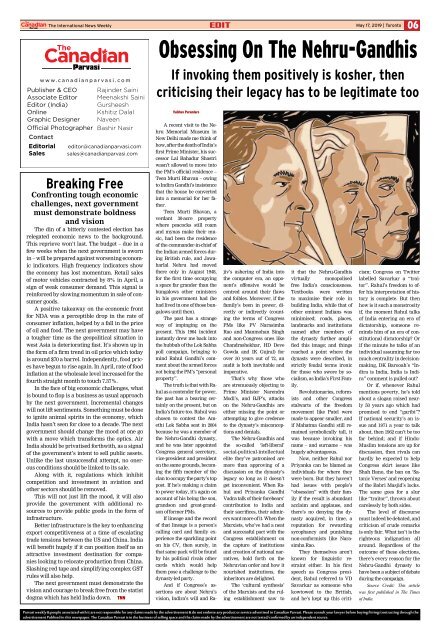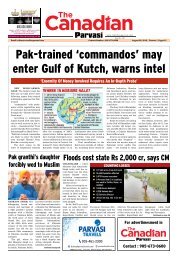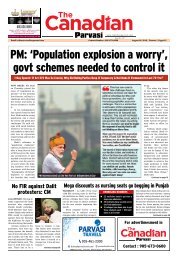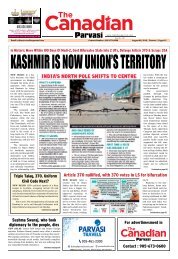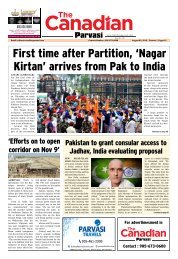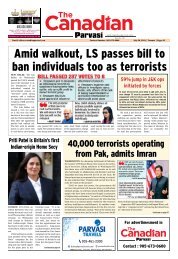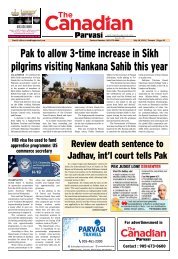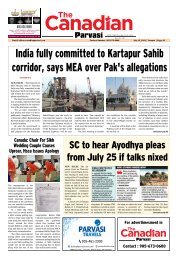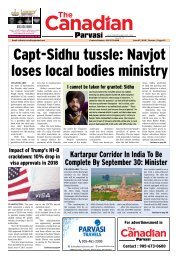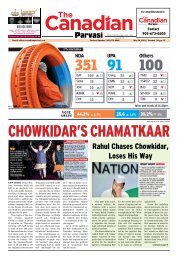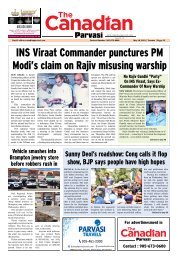You also want an ePaper? Increase the reach of your titles
YUMPU automatically turns print PDFs into web optimized ePapers that Google loves.
<strong>The</strong> International News Weekly Edit<br />
06<br />
May 17, 2019 | Toronto<br />
<strong>The</strong><br />
w w w . canadianparv asi. c o m<br />
Publisher & CEO<br />
Associate Editor<br />
Editor (India)<br />
Online<br />
Graphic Designer<br />
Official Photographer<br />
Contact<br />
Editorial<br />
Sales<br />
Rajinder Saini<br />
Meenakshi Saini<br />
Gursheesh<br />
Kshitiz Dalal<br />
Naveen<br />
Bashir Nasir<br />
editor@canadianparvasi.com<br />
sales@canadianparvasi.com<br />
Breaking Free<br />
Confronting tough economic<br />
challenges, next government<br />
must demonstrate boldness<br />
and vision<br />
<strong>The</strong> din of a bitterly contested election has<br />
relegated economic news to the background.<br />
This reprieve won’t last. <strong>The</strong> budget – due in a<br />
few weeks when the next government is sworn<br />
in – will be prepared against worsening economic<br />
indicators. High frequency indicators show<br />
the economy has lost momentum. Retail sales<br />
of motor vehicles contracted by 8% in April, a<br />
sign of weak consumer demand. This signal is<br />
reinforced by slowing momentum in sale of consumer<br />
goods.<br />
A positive takeaway on the economic front<br />
for NDA was a perceptible drop in the rate of<br />
consumer inflation, helped by a fall in the price<br />
of oil and food. <strong>The</strong> next government may have<br />
a tougher time as the geopolitical situation in<br />
west Asia is deteriorating fast. It’s shown up in<br />
the form of a firm trend in oil price which today<br />
is around $70 a barrel. Independently, food prices<br />
have begun to rise again. In April, rate of food<br />
inflation at the wholesale level increased for the<br />
fourth straight month to touch 7.37%.<br />
In the face of big economic challenges, what<br />
is bound to flop is a business as usual approach<br />
by the next government. Incremental changes<br />
will not lift sentiments. Something must be done<br />
to ignite animal spirits in the economy, which<br />
India hasn’t seen for close to a decade. <strong>The</strong> next<br />
government should change the mood at one go<br />
with a move which transforms the optics. Air<br />
India should be privatised forthwith, as a signal<br />
of the government’s intent to sell public assets.<br />
Unlike the last unsuccessful attempt, no onerous<br />
conditions should be linked to its sale.<br />
Along with it, regulations which inhibit<br />
competition and investment in aviation and<br />
other sectors should be removed.<br />
This will not just lift the mood, it will also<br />
provide the government with additional resources<br />
to provide public goods in the form of<br />
infrastructure.<br />
Better infrastructure is the key to enhancing<br />
export competitiveness at a time of escalating<br />
trade tensions between the US and China. India<br />
will benefit hugely if it can position itself as an<br />
attractive investment destination for companies<br />
looking to relocate production from China.<br />
Slashing red tape and simplifying complex GST<br />
rules will also help.<br />
<strong>The</strong> next government must demonstrate the<br />
vision and courage to break free from the statist<br />
dogma which has held India down. TNN<br />
Obsessing On <strong>The</strong> Nehru-Gandhis<br />
If invoking them positively is kosher, then<br />
criticising their legacy has to be legitimate too<br />
Vaibhav Purandare<br />
A recent visit to the Nehru<br />
Memorial Museum in<br />
New Delhi made me think of<br />
how, after the death of India’s<br />
first Prime Minister, his successor<br />
Lal Bahadur Shastri<br />
wasn’t allowed to move into<br />
the PM’s official residence –<br />
Teen Murti Bhavan – owing<br />
to Indira Gandhi’s insistence<br />
that the house be converted<br />
into a memorial for her father.<br />
Teen Murti Bhavan, a<br />
verdant 30-acre property<br />
where peacocks still roam<br />
and mynas make their music,<br />
had been the residence<br />
of the commander-in-chief of<br />
the Indian armed forces during<br />
British rule, and Jawaharlal<br />
Nehru had moved<br />
there only in August 1<strong>94</strong>8,<br />
for the first time occupying<br />
a space far grander than the<br />
bungalows other ministers<br />
in his government had (he<br />
had lived in one of those bungalows<br />
until then).<br />
<strong>The</strong> past has a strange<br />
way of impinging on the<br />
present. This 1964 incident<br />
instantly drew me back into<br />
the hubbub of the Lok Sabha<br />
poll campaign, bringing to<br />
mind Rahul Gandhi’s comment<br />
about the armed forces<br />
not being the PM’s “personal<br />
property”.<br />
<strong>The</strong> truth is that with Rahul<br />
as a contender for power,<br />
the past has a bearing certainly<br />
on the present, but on<br />
India’s future too. Rahul was<br />
chosen to contest the Amethi<br />
Lok Sabha seat in 2004<br />
because he was a member of<br />
the Nehru-Gandhi dynasty,<br />
and he was later appointed<br />
Congress general secretary,<br />
vice-president and president<br />
on the same grounds, becoming<br />
the fifth member of the<br />
clan to occupy the party’s top<br />
post. If he’s making a claim<br />
to power today, it’s again on<br />
account of his being the son,<br />
grandson and great-grandson<br />
of former PMs.<br />
If lineage and the record<br />
of that lineage is a person’s<br />
calling card and family experience<br />
the sparkling point<br />
on his CV, then surely, in<br />
that same pack will be found<br />
by his political rivals other<br />
cards which would help<br />
them pose a challenge to the<br />
dynasty-led party.<br />
And if Congress’s assertions<br />
are about Nehru’s<br />
vision, Indira’s will and Rajiv’s<br />
ushering of India into<br />
the computer era, an opponent’s<br />
offensive would be<br />
centred around their flaws<br />
and foibles. Moreover, if the<br />
family’s been in power, directly<br />
or indirectly (counting<br />
the terms of Congress<br />
PMs like PV Narasimha<br />
Rao and Manmohan Singh<br />
and non-Congress ones like<br />
Chandrashekhar, HD Deve<br />
Gowda and IK Gujral) for<br />
over 50 years out of 72, an<br />
audit is both inevitable and<br />
imperative.<br />
That’s why those who<br />
are strenuously objecting to<br />
Prime Minister Narendra<br />
Modi’s, and BJP’s, attacks<br />
on the Nehru-Gandhis are<br />
either missing the point or<br />
attempting to give credence<br />
to the dynasty’s misconceptions<br />
and denials.<br />
<strong>The</strong> Nehru-Gandhis and<br />
the so-called ‘left-liberal’<br />
social-political-intellectual<br />
elite they’ve patronised are<br />
more than approving of a<br />
discussion on the dynasty’s<br />
legacy so long as it doesn’t<br />
get inconvenient. When Rahul<br />
and Priyanka Gandhi<br />
Vadra talk of their forebears’<br />
contribution to India and<br />
their sacrifices, their admirers<br />
want more of it. When the<br />
Marxists, who’ve had a neat<br />
and successful pact with the<br />
Congress establishment on<br />
the capture of institutions<br />
and creation of national narratives,<br />
hold forth on the<br />
Nehruvian order and how it<br />
nourished institutions, the<br />
inheritors are delighted.<br />
<strong>The</strong> ‘cultural synthesis’<br />
of the Marxists and the ruling<br />
establishment saw to<br />
it that the Nehru-Gandhis<br />
virtually monopolised<br />
free India’s consciousness.<br />
Textbooks were written<br />
to maximise their role in<br />
building India, while that of<br />
other eminent Indians was<br />
minimised; roads, places,<br />
landmarks and institutions<br />
named after members of<br />
the dynasty further amplified<br />
this image; and things<br />
reached a point where the<br />
dynasts were described, in<br />
strictly feudal terms ironic<br />
for those who swore by socialism,<br />
as India’s First Family.<br />
Revolutionaries, reformists<br />
and other Congress<br />
stalwarts of the freedom<br />
movement like Patel were<br />
made to appear smaller, and<br />
if Mahatma Gandhi still remained<br />
symbolically tall, it<br />
was because invoking his<br />
name – and surname – was<br />
hugely advantageous.<br />
Now, neither Rahul nor<br />
Priyanka can be blamed as<br />
individuals for where they<br />
were born. But they haven’t<br />
had issues with people’s<br />
“obsession” with their family<br />
if the result is abundant<br />
acclaim and applause, and<br />
there’s no denying the dynasty<br />
acquired, in time, a<br />
reputation for rewarding<br />
sycophancy and punishing<br />
non-conformists like Narasimha<br />
Rao.<br />
<strong>The</strong>y themselves aren’t<br />
known for linguistic restraint<br />
either. In his first<br />
speech as Congress president,<br />
Rahul referred to VD<br />
Savarkar as someone who<br />
kowtowed to the British,<br />
and he’s kept up this criticism;<br />
Congress on Twitter<br />
labelled Savarkar a “traitor”.<br />
Rahul’s freedom to offer<br />
his interpretation of history<br />
is complete. But then<br />
how is it such a monstrosity<br />
if, the moment Rahul talks<br />
of India entering an era of<br />
dictatorship, someone reminds<br />
him of an era of constitutional<br />
dictatorship? Or<br />
if the minute he talks of an<br />
individual assuming far too<br />
much centrality in decisionmaking,<br />
DK Barooah’s “Indira<br />
is India, India is Indira”<br />
comment is pulled out?<br />
Or if, whenever Rahul<br />
mentions poverty, he’s told<br />
about a slogan raised nearly<br />
50 years ago which had<br />
promised to end “garibi”?<br />
If national security’s an issue<br />
and 1971 a year to talk<br />
about, then 1962 can’t be too<br />
far behind; and if Hindu-<br />
Muslim tensions are up for<br />
discussion, then rivals can<br />
hardly be expected to help<br />
Congress skirt issues like<br />
Shah Bano, the ban on ‘Satanic<br />
Verses’ and reopening<br />
of the Babri Masjid’s locks.<br />
<strong>The</strong> same goes for a slur<br />
like “traitor”, thrown about<br />
carelessly by both sides.<br />
<strong>The</strong> level of discourse<br />
must indeed be debated, and<br />
criticism of crude remarks<br />
is only fair. What isn’t is the<br />
righteous indignation all<br />
around. Regardless of the<br />
outcome of these elections,<br />
there’s every reason for the<br />
Nehru-Gandhi dynasty to<br />
have been a subject of debate<br />
during the campaign.<br />
Source Credit: This article<br />
was first published in <strong>The</strong> Times<br />
of India.<br />
<strong>Parvasi</strong> weekly & people associated with it are not responsible for any claims made by the advertisement & do not endorse any product or service advertised in <strong>Canadian</strong> <strong>Parvasi</strong>. Please consult your lawyer before buying/hiring/contracting through the<br />
advertisement Publised in this newspaper. <strong>The</strong> <strong>Canadian</strong> <strong>Parvasi</strong> is in the business of selling space and the clains made by the advertisement are not tested/confirmed by an independent source.


